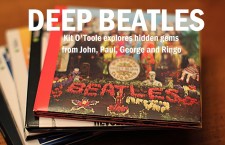1965 proved to be a busy year for the Beatles. Beatlemania continued to take over the globe, the group maintained a whirlwind touring schedule, they shot the film Help!, and they recorded two albums. In the midst of the chaos, the four showed subtle but definite signs that they were maturing artistically.
Cracks in the moptop image first surfaced on 1964’s Beatles for Sale, when darker tacks like “I’m A Loser” and “Baby’s in Black” stood out among uptempo songs that included “Eight Days A Week” and “Every Little Thing.”
Help! showed more signs of their progression, with Dylan-esque tracks like John Lennon’s “You’ve Got to Hide Your Love Away” and Paul McCartney’s classical hybrid “Yesterday.” But 1965 marked the beginning of the Beatles’ transformation with the release of Rubber Soul, a quiet, introspective work that laid the groundwork for Revolver and all subsequent albums. The album contains numerous game-changing songs like “Norwegian Wood” and “Nowhere Man,” but “The Word” stands out for its prophetic lyrics and its subject: love in general, not just romantic love.
In later interviews, Lennon and McCartney claimed they wrote the lyrics while stoned. For the first time, they smoked pot while composing the song by drawing the lyrics in multicolored words on a sheet of paper. According to Barry Miles’ McCartney biography Many Years from Now, McCartney explained that “We normally didn’t smoke when we were working. It got in the way of songwriting because it would just cloud your mind up: ‘Oh, shit, what are we doing?’ It’s better to be straight.” In 1980, Lennon said that while McCartney helped with the lyrics, “it’s mainly mine. You read the words, it’s all about gettin’ smart. It’s the marijuana period. It’s love. It’s a love and peace thing. The word is ‘love,’ right?”
Indeed, “The Word” gives listeners a preview of what was to come just over a year later. Instead of singing that money can’t buy love or discussing how “I give her all my love; that’s all I do,” the Beatles address love in a much broader sense. “Say the word and you’ll be free; say the word and be like me,” Lennon, Harrison, and McCartney harmonize. They suggest that they have achieved a kind of transcendence by simply uttering the word. “Have you heard? The word is ‘love.’ It’s so fine, it’s sunshine,” they croon, arguing that love is a “new” topic that everyone is talking about. But this is another type of love — one that is abstract, tied to nature, and bigger than all of us.
The next verse finds Lennon proselytizing, acting as a preacher: “Now that I know what I feel must be right; I’m here to show everybody the light.” In this role, he wants to share his discovery with listeners and bask in his newfound joy. He has clearly researched the topic, implied by the lines “everywhere I go I hear it said, in the good and the bad books that I have read.” The word is “just the way,” Lennon sings, and with McCartney and Harrison emphasizes his message’s importance: “Say the word, ‘love,’” they chant before the harmonium takes over.
As the song fades out, one can digest the Beatles’ concluding argument: this word will play a major part in the near future. By submitting to Love with a capital “L,” we too can find this transcendence that others have thus far not achieved. Like Harrison demands in “Think for Yourself,” the group lets us decide whether to follow their lead.
As usual, the Beatles’ recording sessions proved astoundingly fast and efficient, as the track was arranged and recorded in a single evening on November 10, 1965. The basics — guitar bass, and drums — were laid down first, then other instruments like maracas and the harmonium (played by producer George Martin), and finally the tight harmony vocals. Lennon’s voice is double tracked on the song, creating four-part harmony. Mixing commenced a day later, but the stereo mix had to be redone on November 15.
Rubber Soul went on to become one of the Beatles’ most critically acclaimed albums, and represents a huge step in their creative development. In the Anthology documentary, Harrison noted that he always considered Rubber Soul and Revolver “volume one and volume two,” resembling bookends. At the very least, Rubber Soul illustrated their interest in politics and their increasing awareness as spokesmen for their age group.
“The Word” remained a deep album track until 2006, when the Cirque du Soleil show Love included a mashup with “Drive My Car” and “What You’re Doing.” Perhaps inspired by this unique showcase, McCartney resurrected the tune during his 2011 On the Run tour. During his Bologna show on November 26, 2011, he performed “The Word” in a medley with “All You Need Is Love,” a fitting song pairing thematically and chronologically. “The Word” foreshadowed the Summer of Love anthem and signaled an impending change in direction for rock and pop culture.
- The Rescued Early Paul McCartney Song That Completed ‘Beatles For Sale’ - December 4, 2024
- A Rare Beatles Cover Proves John Lennon Was Wrong About His Voice - November 26, 2024
- How John Lennon Came Roaring Back on the Beatles’ White Album - November 22, 2023



Hi – lifelong Beatle fan and Beatle scholar here – getting back into it after several years – just discovered your website. I’m enjoying your posts/analyses. I’ve always thought it was interesting how “peace” and “love” became somehow sinister when associated with hippie/youth culture. They espoused similar values even earlier in We Can Work It Out.
Love Deep Beatles! Haven’t heard this version of The Word with Paul singing. Also just listened to You Never Give Me Your Money. Never knew it was about Klein and heard versions new to me. Lots of cool new (to me) Info.
Pingback: Grip Weeds, Anderson Council + Others - 'Jem Records Celebrates John Lennon' (2020)